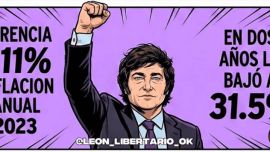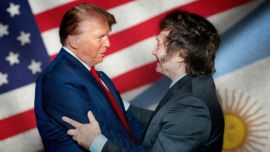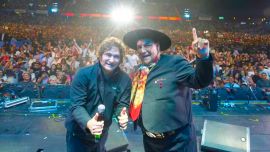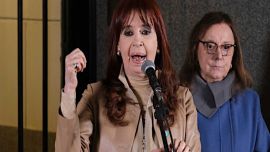Emmanuel Macron stepped up his opposition to a trade deal between the European Union and the South American Mercosur bloc as he is faced at home with farmer protests sparked in part by foreign competition.
The French president contacted European Commission President Ursula Von Der Leyen last week with a plea to end the current round of negotiations, according to people familiar with the matter.
A government spokeswoman, Prisca Thevenot, confirmed that France told the head of the EU’s executive arm that the deal shouldn’t proceed unless farmers in four South American nations are subjected to the same environmental rules as those in Europe. The European Commission declined to comment, referring to its practice of not commenting on bilateral conversations.
The EU and the Mercosur countries — Argentina, Brazil, Uruguay and Paraguay — have been in talks to clinch a trade accord for more than two decades. An agreement was announced in 2019 but never implemented amid new EU environmental demands.
Macron’s move is ultimately an effort to appease French farmers who have started blocking highways around Paris with their tractors. With two French farmers’ unions calling for a siege of Paris, they aim to pressure the government into further concessions to ease the burden of rising costs and red tape.
Many protesters are also pointing to what they describe as unfair competition from foreign countries, which they say is facilitated by free-trade agreements such as Mercosur.
EU officials have been worried that protests by farmers, which also hit parts of Belgium on Monday, are likely to spread further.
Farmers also attack the recent free trade deal with New Zealand, which French Agriculture Minister Marc Fesneau defended earlier Monday as important. The EU approved the deal with New Zealand in November. Farmers were also a key opposition force against a free-trade agreement with the United States that was frozen under Donald Trump’s Presidency.
Last week, some 100 lawmakers in Macron’s party sent a letter to von der Leyen to warn about the “dangers” of Mercosur for French farmers, calling it “anachronistic.”
Speaking from a UN conference about climate in Dubai in December, Macron had already said that environmental concessions obtained by the bloc weren’t sufficient, adding that products imported from Mercosur countries would have “a disgusting carbon footprint.” By contrast, German Chancellor Olaf Scholz has publicly been calling for a swift conclusion of the talks.
Macron is set to travel to Brazil in March. A person close to the president said he was confident his position on Mercosur wouldn’t affect the relationship with Brasília.
The farmers’ protests, which started earlier this month, are putting Macron in a difficult position as Marine Le Pen’s National Rally seeks to capitalise on the movement. The French president just reshuffled his government and appointed a new prime minister, after passing a divisive immigration law with the support of the far-right in December, a move that upset the left-leaning members of his party.
by Ania Nussbaum, Samy Adghirni & Jorge Valero, Bloomberg




















Comments